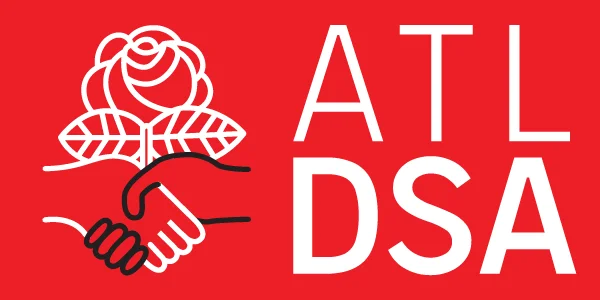

David Bentley Hart | Bible Translation, Christian Socialism, & the Moral Obligation of Belonging


Teamsters Win Historic Contract Demands
Read the Official Teamsters Press Release
Teamsters Win!
The Teamsters have reached a tentative agreement with UPS by staying firm to their demands, showing that if we fight for what we deserve we can win! The agreement includes major changes, including:
- Historic wage increases. Existing full- and part-time UPS Teamsters will get $2.75 more per hour in 2023. Over the length of the contract, wage increases will total $7.50 per hour.
- Existing part-timers will be raised up to no less than $21 per hour immediately, and part-time seniority workers earning more under a market rate adjustment would still receive all new general wage increases.
- General wage increases for part-time workers will be double the amount obtained in the previous UPS Teamsters contract — and existing part-time workers will receive a 48 percent average total wage increase over the next five years.
- Wage increases for full-timers will keep UPS Teamsters the highest paid delivery drivers in the nation, improving their average top rate to $49 per hour.
- Current UPS Teamsters working part-time would receive longevity wage increases of up to $1.50 per hour on top of new hourly raises, compounding their earnings.
- New part-time hires at UPS would start at $21 per hour and advance to $23 per hour.
- All UPS Teamster drivers classified as 22.4s would be reclassified immediately to Regular Package Car Drivers and placed into seniority, ending the unfair two-tier wage system at UPS.
- Safety and health protections, including vehicle air conditioning and cargo ventilation. UPS will equip in-cab A/C in all larger delivery vehicles, sprinter vans, and package cars purchased after Jan. 1, 2024. All cars get two fans and air induction vents in the cargo compartments.
- All UPS Teamsters would receive Martin Luther King Day as a full holiday for the first time.
- No more forced overtime on Teamster drivers’ days off. Drivers would keep one of two workweek schedules and could not be forced into overtime on scheduled off-days.
- UPS Teamster part-timers will have priority to perform all seasonal support work using their own vehicles with a locked-in eight-hour guarantee. For the first time, seasonal work will be contained to five weeks only from November-December.
- The creation of 7,500 new full-time Teamster jobs at UPS and the fulfillment of 22,500 open positions, establishing more opportunities through the life of the agreement for part-timers to transition to full-time work.
- More than 60 total changes and improvements to the National Master Agreement — more than any other time in Teamsters history — and zero concessions from the rank-and-file.
The decision has not yet been officially ratified, but given that all of the contract demands were met by UPS, it seems likely that this will be agreed upon by all Locals.
What can we learn from this?
As socialists, what can we take away from this? Although there are many elements to this complex organizing effort that has culminated after years of change within the Teamsters and within UPS from before the pandemic until now, let’s highlight two things in particular that made this successful:
- Meaningful demands and unwavering commitment to them. UPS creates a list of demands that improves the workplace for everyone, from rookie part-timers to full-time veterans. This sort of contract is appealing to all workers and shows that they are looking out for everyone. As organizers, we should always be seeking buy-in from the entire working class and responding to their individual circumstances as best we can. Additionally, once we agree upon our demands, we should not be willing to abandon them for the sake of expediency. UPS Teamsters were willing to go on strike until their demands are met and we should always keep our ambitions as high.
- Practice pickets show the capitalists our power. UPS Teamsters mobilized their workers to perform a dress rehearsal for the strike and held practice pickets nationwide, including here in Wilmington. Not only does this help workers improve logistics for a real strike, but the attendance for these practice pickets seems to have shown the bosses that workers were serious about their strike threat. By doing acts that demonstrate our power, we can make the capitalists more willing to concede to our demands because there is a credible threat to their power and wealth. If a practice strike is enough to get a full concession, imagine what more could be won.
Congratulations to the UPS Teamsters on this historic victory!


Radical Democracy as a Solution to Liberal Democratic Failures
Member Bryce Springfield
Radical democracy is not a term that many of us are used to hearing in our political science courses. You might hear it in one of the few classes that cover social movements and extra-parliamentary politics, but in general students are exclusively exposed to a rather limited understanding of democracy that not only fails to acknowledge the possibility of democracy beyond government, but that also has a fundamental distrust in the capacity of the “bewildered herd” — as Walter Lippmann once called the public — to make its own decisions about the institutions that affect our everyday lives.
This system is one wherein constituents, under a particular constitutional arrangement, “freely and fairly” elect representatives who suggest and vote on government policies on the public’s behalf. In addition, it features a market-based economic system with non-democratic firm-level relations between private owners on the one hand, and non-owner workers and consumers on the other. Many would call this capitalist, representative system a “liberal democracy.”
From direct democracy to liberal democracy
Many prehistoric societies throughout a large span of the human experience saw direct or semi-direct democracy as a natural system of self-management in both politics and economics. Yet in recent history, some have treated liberal democracy as the form of social organization most compatible with human nature.
From what we know about early democracies, several early agricultural societies, such as those of Phoenicia and Mesopotamia, are thought to have adopted democratic institutions long before the Greek city-states did. Going even further back, a wide range of prehistoric societies tended to “make all important collective decisions by consensus, and many of them [did] not even have chiefs,” with larger bands often breaking into smaller units to allow easier consensus-making, according to a 1993 paper.
Some have argued that the democratic aspect of many early societies may have contributed to a largely “peaceful order.” Contrary to what many 19th-century Western thinkers theorized about prehistoric violence and war, available data suggests that only around 2% of human fossils from 2 million to 14,000 years ago show evidence of a “traumatic violent injury,” while that percentage dramatically increased following the development of centralized state societies after the Agricultural and Industrial Revolutions.
In Ancient Athens, from roughly the 6th century BCE to the 4th century BCE (with interruptions), “democracy” referred to a system of active popular participation (limited to adult male citizens) in the formulation of legislation and the exercise of executive functions. The selection of the citizens who performed these functions was accomplished via sortition, in that members of the public were chosen at random to participate in decision-making assemblies, similar to modern juries. Though limited in terms of inclusion, Athens exercised a much more direct form of democracy than that of today’s Western democracies. The Roman Republic (509 BCE — 27 BCE), on the other hand, is the most influential early case of a representative democracy, with popularly elected officials performing political duties instead of the people themselves, inspiring future democratic republics.
Fast forward to the 18th century, and one observes the “liberal democratic” model developing as an alternative to the radically authoritarian and feudal regimes that dominated Europe at the time. With the support of a range of Western intellectuals, often viewed as an extremist and unreasonable fringe by their contemporaries, the idea of a representative democratic government featuring constitutional rights and a capitalist economy posed a deep challenge to existing institutions. Over time, liberal democratic ideals gained significant traction among European publics, enabling revolutions first in the American colonies and then France, and later in other European countries and, eventually, their colonies as well.
I mention these details to put liberal democracy, particularly its representative democratic and capitalist elements, in perspective; they are but a blip in human history, and thus are clearly not the products of human nature until recent centuries.
Today’s crisis of liberal democracy
I agree with the premise that the formation and expansion of liberal democracy over the last three centuries marks a positive change in human development away from authoritarian and feudal systems of political and economic domination. This revolutionary process has normalized democracy as a universal ideal, and standardized legal equality as well as freedom of thought, speech, association, religion, and the press. Liberal democracies have often failed to live up to these same ideals, particularly when it comes to domestic social equality and colonial domination, but in many cases they have successfully challenged and overturned systems of oppression around the world.
In today’s age, however, there are a few respects in which liberal democracy is failing to meet the rising standards expected by working-class people who make up the global majority.
Capitalist economy
Recent polls reveal that a staggering 60% of an international sample of workers are emotionally detached at work, while only 33% feel engaged with their labor. In the US, the standard-bearer of global capitalism, 50% of workers report frequent stress at work, with their most frequently reported cause of workplace dissatisfaction being unfair treatment.
Though even Karl Marx and Friedrich Engels openly acknowledged the incredible power of capitalism as a force for global industrialization, capitalism is a fundamentally undemocratic system wherein the owners of the means of production (i.e., capitalists) hold outsized power over those who operate the means of production (i.e., workers). Similar criticisms have been made about many state socialist solutions, like those of the Soviet Union, Maoist China, and various other experiments where production was controlled by an undemocratic bureaucratic apparatus holding outsized power over the workers they claimed to represent — an arrangement often justified by asserting that the Communist Party aristocracy was the workers, or even that the masses were too stupid to direct their own workplaces. Yet mainstream political commentators rarely extend this criticism to capitalism, even though a nearly identical logic applies.
As the anti-authoritarian left has understood for generations, in either of these systems — no more in the authoritarian socialist case than in the capitalist case — the workplace where most workers spend the majority of their lives is dictatorially controlled by an unelected executive or board of executives, who may arbitrarily set wages and undemocratically select unit managers. Even in wealthy social democracies with strong welfare programs and powerful labor unions, workers are forced to remain employed to avoid a squalid lifestyle. Meanwhile, in the Global South, the consequences for those who choose not to degrade their bodies, minds, and time enough for capitalism can include starvation or death. In either case, it is a “free” choice between exhaustion or poverty.
Working conditions around the world are often very poor, woefully ill-compensatory for the economic value produced, and even unsafe due to workers’ lack of influence over workplace decision-making. On the other hand, if workers could exercise democracy in the workplace, it is highly likely that they would not make the same decisions as those of a disconnected capitalist on issues related to safety, benefits, wages, and employment. Not only that, workers would also have more direct incentives to reduce irresponsible risk because of profit sharing and increased sensitivity to the threat of losing their jobs. Reducing risk throughout the economy would then mitigate the possibility of bankruptcy and wider economic crises, and give innovators fewer negative incentives and more financial stability to do their valuable work.
Furthermore, workplace democracy would address the “local knowledge problem” that right-wing economists seem all too happy to attribute to centrally-planned economies. This theory refers to the argument that central planners, such as those of state socialist regimes, lack much of the information necessary for rational economic decision-making, as such information is distributed amongst individual actors.
Yet under capitalism as well, owners, executives, and high-level managers frequently do not have extensive direct experience in everyday work, limiting the information they have to make informed firm-level plans. By ensuring that all of those who work for the factories, the shops, and the gig services have an input in the direction of their respective firms, whether through representatives or direct decision-making, firms can be better equipped to improve efficiency, productivity, and stability.
These theoretical predictions are generally supported by major literature reviews of both worker-owned cooperatives and, to a lesser extent, union-represented workplaces. Worker cooperatives tend to be more productive and stable through recessions than other firms, and they also tend to have longer lifespans, greater employee satisfaction, lower employee turnover, and greater efficiency. Union-represented workplaces also see significantly higher pay than comparable workplaces, as well as better workplace safety and increased firm stability.
Representative democratic government
Although some countries express satisfaction with their representative systems, support for democracy in many countries has significantly declined, while in others pro-democracy sentiment has simply always been low. In a 34-country survey conducted by the Pew Research Center in 2019, the median country had 52% dissatisfaction with democracy in their country, compared to a mere 44% satisfaction. In Latin America, a very high portion of respondents — 70% — said they were dissatisfied with democracy in their respective countries, with countries like Ecuador and Peru in particular seeing around 10% satisfaction. This data reflects significant declines in democratic satisfaction from just two or three decades ago.
What is causing this? One possible reason could be that populations are feeling increasingly disconnected from their representatives, with 64% of citizens in the median country surveyed by the Pew Research Center agreeing that elected officials do not care about “what people like them think.” In many representative democracies, campaign donations and politicians’ own investments provide incentives to stray from the popular will in favor of special interests. In the US, we can see this tendency expressed in relation to a vast range of policies — from universal healthcare to free college, to marijuana legalization, to abortion rights, to a $15 minimum wage — each of which have strong public support, but none are currently close to promulgation at the national level. A variety of studies have demonstrated that United States representatives, though partly influenced by voter preferences, frequently give outsized preference to policies favored by the wealthy.
One factor that may explain this proposed relationship is the fact that elected representatives, on average, are not of comparable socio-economic status to that of the general public, typically being significantly wealthier. As a consequence, even those potentially sympathetic to the working class simply do not experience the everyday difficulties that workers regularly face, and can therefore suffer from, again, the local knowledge problem frequently cited by right-wing economists.
These developments are especially dangerous in light of the democratic backsliding that has recently occurred in Hungary, Poland, Nicaragua, Bolivia, India, Tunisia, Turkey, and other countries where executives and single parties have increasingly dominated over legislatures and courts, and have enforced laws that seriously limit media and associational freedoms. These trends likewise menace the United States, where several major politicians have denied election results and where state governments regularly limit voting rights. As confidence in democracy declines, more and more countries are at risk of autocratization — an alternative that I, along with liberal democrats, assert is worse than the liberal democratic arrangement.
Some theorists of democratic backsliding, such as the authors of How Democracies Die — the book that apparently helped push Joe Biden to run for president in 2020 — have argued that merely “restor[ing] the basic norms” of liberal democracy and including a more diverse range of people within the liberal democratic mechanisms will be enough to save democracy. However, the true roots of democratic backsliding go much deeper than this, as has been shown in the above analysis.
Further than merely questioning the status quo — a civic duty in any healthy democracy — authoritarian populists threaten democracy by claiming to be the only ones who can truly represent the “real people.” But creating the institutions and providing the spare time for people to represent themselves could put a significant number of obstacles in the way of these despotic distortions of the public will. The capacity of authoritarian populists to skillfully abuse the top-down model of representative democracy in order to disseminate antidemocratic attitudes and reforms would be largely immobilized in such a scenario.
Given that authoritarian populists are the usual suspects in advancing democratic backsliding in the modern day, and that said authoritarian populists gain power through the personality-oriented politics of representative democracies, it would serve democrats well to push for an alternative that makes the path to autocratization much more challenging.
Radical democracy as an alternative
A few radical democratic projects have succeeded in reviving direct democratic as well as workplace democratic ideals in the last few decades, while simultaneously maintaining the benefits of constitutional rights prioritized by liberal regimes.
In 1994, for example, a large portion of the Mexican state of Chiapas established autonomy through the high-profile Zapatista Uprising, which was waged in protest against what the largely indigenous population saw as an authoritarian and undemocratic government. Since then, 360,000 Zapatistas have enjoyed participatory democracy in a decentralized system of government, alongside a democratic economy consisting of worker cooperatives and common ownership of land, and a democratic education system involving both students and parents.
In 2012, during the Syrian Civil War, four million people suffering under the aggression of the Syrian and Turkish governments, as well as of ISIS, formed the Democratic Federation of Northern Syria (also known as Rojava). They gained their autonomy through the establishment of a federalist system of participatory democracy, with significant sectors of the economy being managed democratically through worker cooperatives and workers’ councils.
But what would such a system look like for Princeton students? I will end with a description of a hypothetical alternate universe in which Princeton students live in a radically democratic society.
Suppose that in this alternate universe, there is a major push among students for the University to divest from fossil fuels. If the level of support for this change was similar to that in our universe, divestment would be an overwhelmingly obvious policy to pursue, given that 82% of undergraduates favor it. Assuming that a majority of University employees and graduate students also agree with this change, which is a fair supposition given the high number of faculty endorsements behind it and the generally liberal or leftist political attitudes of students and working New Jersey residents, the matter of fossil fuel divestment could be resolved almost immediately, as opposed to only partially after many years.
Suppose that just like at the real Princeton, the alternate Math Department enjoys an atrocious reputation among undergraduate students for the poor organization of its courses and the mind-numbing teaching style of some of its professors. With student input actually counting for something, rather than simply being diverted into listening sessions, and then committee meetings, before finally being ignored, perhaps students could successfully influence the department into seeking out more dedicated lecturers rather than only researchers who may not be passionate about teaching their students.
Suppose that you work at the local Starbucks on Nassau Street, and you hate the grueling working conditions there, as plenty of baristas have expressed in our own universe. If the Starbucks were a worker cooperative, the employees who keep the store running would have significantly more power over their wage rates and working conditions, meaning they could raise wages to a level that encourages both higher productivity and more job applicants. Workers would ensure that profits are no longer aimed at supporting investors and executives, but rather at supporting all who contribute to the productive process.
Within the government of this alternate universe, perhaps marijuana would be quickly legalized, so students would not have to worry about state violence or University discipline against them for using the drug. Perhaps we would already have a public healthcare system that eliminates the frustrating and expensive reimbursement bureaucracy we face with the Student Health Plan, and we would not have to carefully search for in-network doctors nearby — instead, we would know that all doctors are covered.
And finally, with mechanisms of direct participation, perhaps we could reduce the level of atomization and loneliness in our society, and therefore develop a better sense of mutual understanding and respect for each other and the issues that matter to us. Maybe psychologists both on- and off-campus would be offered higher pay through their own workplace democracies, as well as through popular participation in public healthcare policy. This would encourage more psychologists to come and support young people, a particularly vulnerable demographic in terms of mental health issues, a key concern for many in the Princeton community given the alarming number of recent mental health-related tragedies.
Liberal democratic institutions are failing us at this stage of human development. Radical democracy, on the other hand, provides answers to many of the dissatisfactions that students, workers, and voters now face. Thus, radical democracy offers a new understanding of democracy appropriate for a new age.
This piece was originally published in The Princeton Progressive.


Cuba under siege: behind the Biden blockade
Our focus this week is on Cuba, where a 62 year blockade is being continued by President Biden. We’ll be hearing from the DSA. International Committee activists campaigning to end the blockade on a recent political win, and a from Desirée Michelle Molina, a recent Columbia University graduate who has just spent four months living in the country. Our episode starts with an update from Jeremy Cohan, co-chair of New York City DSA, about what to expect from the DSA’s National Convention in Chicago this weekend.


City Council chose Blackstone over the people
On Monday, July 24, 2023, Columbus City Council voted 6-1 to approve the American Campus Communities / Blackstone development proposed at 50 West Lane Avenue.
Blackstone is the largest corporate landlord in history. They own thousands upon thousands of properties across the United States and abroad. They have earned international condemnation for their aggressive rent hikes and use of eviction as a profit-making scheme.
Now, City Council has given them a piece of our city–and are poised to sweeten the deal even further by handing over the public’s money in the form of tax abatements.
Despite so many community members testifying about Blackstone’s horrific human rights record and business practices–including its having been lambasted by the United Nations for its role in the global housing crisis–Council rolled out the red carpet to welcome them into our housing market. Even worse, Blackstone indicated that they intend to seek tax abatements for their trouble.
This is yet another example of Council weighing the business interest of a developer over the wellbeing of its constituents. It confirms our fear that Council’s purported “Housing for All” policies are a sham, meant only to placate voters while they continue to line corporations’ pockets with money lifted from our neighborhoods and schools.
For months, constituents flooded Columbus’s democratic channels with their fears over Blackstone coming into our city, providing written and spoken testimony at the University District Area Commission, the Development Commission, and finally, City Council. Of these bodies, only the Area Commission rejected the proposal, though City Council neglected to listen even to them.
Columbus DSA’s Housing Priority Campaign made it our responsibility to inform the public about Blackstone’s abysmal history and organize opportunities to speak out against them. We are so proud of the energy and tenacity the community supplied to our campaign. Columbus DSA will continue to oppose tax handouts for the rich so long as the working people of our city struggle to find housing that is affordable, dignified, and secure. We are sick of watching the working class get cut out of the deal. We are tired of seeing our schools gutted, our public services plundered, and our neighbors left to rot on the sidewalk. We are finished with the housing crisis being used as an excuse to build playgrounds for the wealthy instead of seeing our people safe. A bed for every person. A meal in every stomach. A city for every one of us. That is our future, and we are the ones to build it. Not Blackstone.


“Militant stewards will be born out of this fight”: Ready to Strike, Teamsters Force UPS Concessions
By Emil McDonald
On Saturday, July 22, 2023, fifty workers and community members rallied at San Francisco City Hall in solidarity with 340,000 UPS Teamsters. Since UPS walked away from the bargaining table earlier in the month, UPS workers had been busy preparing for a potential August 1 national strike with the potential to shut down 7 percent of U.S. GDP.
The tide had turned a day earlier, when UPS relented and agreed to return to the bargaining table. Just a few days later, on July 25, the union announced a tentative agreement (TA) for a new five-year contract. Members will be voting on whether to ratify the TA through August 22, and the strike deadline has been postponed.
At the July 22 rally, Emil McDonald, a five-year UPS worker and member of Teamsters Local 315 in Richmond, CA, spoke about the changes that he saw in the union’s rank and file, and beyond, as a result of strike preparations. – The Editors
A UPS Teamster at the Local 315 “practice picket” in Richmond, July 20. (Photo: R. Marcantonio)
As many of you may know, on July 5th negotiations between the Teamsters and UPS broke down. UPS told our negotiating committee they had “nothing more to give.” This is a company that recently paid more than $5 billion dollars in dividends to Wall Street and bought back $3.5 billion of its own stock so that executives and major shareholders could fatten their wallets.
Not only do we know that UPS has a LOT more to give —- we’re gonna make sure they give it. We’ve made it perfectly clear to UPS that if they can’t find the money to give our essential workers a living wage and reward some of the hardest working people in the country for the tens of billions of dollars we made them during the pandemic, UPS executives will be putting their own company on strike and that profit faucet is gonna get shut off.
Thank you all so much for being here and for supporting UPS Teamsters as we fight for a contract that will improve the lives of hundreds of thousands of workers and bring historic change to our union.
The kind of change I’m talking about isn’t just union leadership that is willing to build a credible strike threat and go to the mat for our lowest-paid members. It is the experience of rank-and-file Teamsters put into motion, united with the community to win a good contract for ourselves.
For the last few weeks, all over the country UPS Teamsters have been holding practice pickets outside of our hubs joined by DSA, PSL, Jobs with Justice, our friends and families–even some of our customers.
Drivers I work with are asking me about these signs they keep seeing up out on road. In store windows, taped to peoples’ front doors—some have even taped the signs up inside their trucks.
Your efforts are not going unnoticed. It is one thing to feel cheated or unappreciated as an individual worker. Everyone here has felt that and it sucks. But when you see that you are not alone and that you have brothers and sisters who are willing to fight with you and that the community has your backs — it can be a very powerful thing.
The experience of banding together and fighting for something that’s right changes you. It cuts through all of the noise and the cultural divides that keep us powerless and disillusioned.
A couple of Teamsters in my local — who to my knowledge had never attended a picket line before — came out to San Francisco this week to join academic workers at a rally at the UC Regents meeting. This is the kind of change I’m talking about. Seeing yourself as part of a broader labor movement. United we fight, divided we beg.
Emil McDonald celebrates a successful practice picket with a co-worker (Photo: R. Marcantonio.)
Whatever happens between now and when we have a new UPS contract, the contract campaign over the last year has created hundreds if not thousands of new shop floor leaders in our union and given us experience organizing against one of the largest corporations in the United States. This is something we will continue to build on in the coming years. Militant stewards will be born out of this fight. Solidarity will be born out of this fight. Five years from now, when it’s time to negotiate the 2028 contract, we will be many times stronger and many times wiser from the start.
And guess what? It turns out maybe UPS does have something more to give than poverty wages. They must have checked their couch cushions and went to Coinstar because this week they reached out to our union requesting to go back to the table in an effort to avoid a strike.
But when Sean O’Brien and our NorCal negotiators go back to the table next week they will not be alone. They will be backed by the tens of thousands of Teamsters who attended practice pickets, 80,000 supporters who signed petitions demanding a living wage for part-time workers and the knowledge that our members — backed by our brothers and sisters in the labor movement and our communities —- are ready to strike if we have to to win what we deserve.
Emil McDonald is a UPS Teamster and a member of Local 315 in Richmond, CA.


HDSA for an Anti-Zionist DSA
The delegation of the Houston chapter of the Democratic Socialists ofAmerica stands with the BDS Working Group in support of their proposed amendment to NPC Recommendation #8, “Make DSA an […]
The post HDSA for an Anti-Zionist DSA appeared first on Houston DSA.


Statement in Response to Lawsuit to Stop RTC
For Immediate Release: July 28th 2023
Contact righttocounseljc@gmail.com
The Right to Counsel JC coalition is not surprised by Ron Simoncini’s baseless and frivolous lawsuit meant to slow down the implementation of much needed aid for Jersey City’s housing crisis.
The Mount Laurel legal decisions made in the New Jersey Supreme Court give municipalities the right to do what they would like with money raised for the affordable housing trust, including utilizing the fees for administrative purposes like distributing the Right to Counsel program.
Landlords and property owners are already favored by the system, the law, and are more often than not already represented in housing court. This is about balancing the scales and joining 20 other jurisdictions that have also passed RTC.
The will to fund our right to counsel with a fee that many other cities in New Jersey have also raised is a political decision. We plan to primarily organize a mass movement of tenants to bring public political pressure on these shady real estate actors, but also fight the suit and win.
We cannot let a few rich and powerful real estate players determine policy that impacts the over 70% of people who rent in our city.


Atlanta DSA Stands in Solidarity with Rank-and-File UPS Teamsters
For over a year, UPS Teamsters have been prepping for the largest private-sector contract fight this country has seen in decades – saving money for personal strike funds, signing pledge cards, and in more recent weeks, organizing practice pickets in the early morning hours outside of UPS facilities. UPS, meanwhile, repeatedly delayed the bargaining process by failing to come to the table in good faith and presenting workers with an inadequate contract. Following broken down negotiations mid-July, thousands of Teamsters and community supporters flocked to practice picket lines and began to seriously accelerate preparations for a nationwide strike.
After weeks of coordinated practice pickets and the increasing fear of a work stoppage, UPS was convinced to return to the bargaining table. On Tuesday July 25th, the Teamsters national negotiating committee announced a tentative agreement with UPS, subject to a vote of its membership which will begin August 3 and last until August 22. DSA stands in unflinching solidarity with the 350,000 UPS Teamsters whose tireless militancy gave their negotiating committee strong leverage throughout this fight.
Despite the narrative pushed by corporate media that the deal is entirely sealed, approval of this tentative agreement is entirely up to the rank-and-file to vote on, and Atlanta DSA commits to stand with workers no matter the outcome of this vote. The gains made in this tentative deal were only possible because of years of hard work and rank-and-file organizing on the ground, and the credible threat of a strike that would cost the company billions. Contrary to UPS’s narrative, it was worker power – not corporate benevolence – that forced UPS’s hands in making significant concessions like ending the two-tier wage system, protecting against forced overtime, securing air conditioning in delivery trucks, making MLK day a paid holiday, and more. Workers bravely organized to withhold their labor, hold down picket lines, and build meaningful community support for their efforts. For this all UPS Teamsters should be extremely proud, and we are proud to stand in solidarity with them through the duration of this fight until the last vote is cast and beyond!
Under capitalism, major companies like UPS are incentivized to maximize profits at all costs, at the expense of human safety and dignity. Both part-time and full-time UPS workers bore the brunt of the pandemic – risking their own lives to deliver essential medication and other goods to working people and families around the country. These workers on the front lines are the reason UPS brought in record breaking profits of $10 billion in 2021, and still, because of corporate greed, UPS CEO Carol Tomé takes home a larger salary in one day than the average UPS worker earns an entire year. DSA will always stand with workers fighting back against injustice and demanding their fair share — no matter whether Teamsters vote to accept or reject their TA. The UPS Teamsters have run a militant, fighting campaign that left a major company shaking in its boots. Their organizing will inspire workers everywhere to continue building power and resistance through their leverage to withhold their labor. Solidarity forever – when workers fight, we win!



Organizing for Change at Amazon's JFK8 with ALU Democratic Reform Caucus
When workers at the JFK8 facility in Staten Island won the first union at an Amazon distribution facility on April 1, 2022, by voting to form the independent Amazon Labor Union, their stunning victory was a surprise and an inspiration. Now, a little over a year later, workers at that same facility are organizing for reform to the Amazon Labor Union, which they say has adopted a top-down structure that stifles shop floor democracy. Regular listeners of Revolutions per Minute will certainly be familiar with union reform efforts in more established unions like UAW, the Teamsters, and UFCW, but the Reform ALU movement brings a new twist to this common story by organizing within an independent union that has yet to reach a first contract for its workers. To understand this moment and what led up to it, we speak live with David-Desyrée, a worker-organizer at the JFK8 facility and a member of the Amazon Labor Union Democratic Reform Caucus.
Follow the reform efforts inside Amazon Labor Union on Twitter @ReformALU or Instagram @reform_alu.